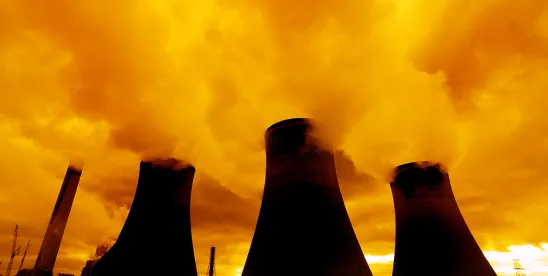After considering similar legislation in two prior sessions, the Colorado General Assembly passed, and Gov. Jared Polis signed into law, House Bill 25-1040 which explicitly adds nuclear energy to the state’s statutory definitions of “clean energy” and “clean energy resource” for purposes of complying with Colorado’s carbon dioxide emission reduction requirements and applying for financial assistance under Colorado’s Rural Clean Energy Project Finance Program. In so doing, Colorado joins more than a dozen other states that consider nuclear power to be a clean energy resource under various state energy policies, and is consistent with the growing number of states taking legislative, regulatory, or policy steps to support or at least consider adding nuclear power to their energy mix.
Acknowledging Colorado’s projected growth in peak electricity demand and the potential energy supply, reliability, climate, and economic benefits of nuclear energy, including advanced reactors such as Small Modular Reactors (SMRs), the legislation expands the statutory definitions to include “nuclear energy, including nuclear energy projects awarded funding through the United States Department of Energy’s Advanced Nuclear Reactor Programs.”
Under Colorado’s carbon dioxide emission reduction statute, qualifying retail utilities in Colorado are required to submit to the Colorado Public Utilities Commission (CPUC) a plan detailing how they intend to reduce by 2030 carbon dioxide emissions associated with their electricity sales by 80 percent as compared to 2005 levels, and how they will seek to achieve 100% emission free electricity sales by 2050. For compliance purposes, the Statute incorporates the “eligible energy resources” that can be used to comply with Colorado’s separate Renewable Energy Standards (RES); these include recycled energy, renewable energy resources (wind, solar, geothermal, new small hydropower, and certain biomass), and renewable energy storage, however, nuclear energy is expressly excluded. Recognizing that not all clean energy resources may be considered renewable, the Statute also allows any other “electricity-generating technology that generates or stores electricity without emitting carbon dioxide into the atmosphere.” While this catch-all language arguably encompasses nuclear energy, HB25-1040 amends the statute to remove any doubt and emphasize the potential benefits of nuclear energy.
Colorado’s three largest electric utilities are in the process of implementing their respective CPUC-approved clean energy plan or electric resource plan that meets the state’s emission reduction requirements. While none of the plans presently include nuclear power, Colorado’s largest investor-owned electric utility, Public Service Company of Colorado (PSCo), has indicated it is open to considering nuclear energy resources in the future.
HB25-1040 also expands the types of energy that qualify for potential financial assistance through Colorado’s Rural Clean Energy Project Finance Program. The Program allows certain rural property owners to apply to their board of county commissioners for the issuance of tax-exempt private activity bonds to help finance the construction, expansion, or upgrade of a clean energy project having a capacity of no more than 50 MW and which is owned by and located on the property owner’s land. The electricity generated by such a project would be delivered to the cooperative electric association in whose service territory the project is located. Similar to Colorado’s RES, the Program defined “clean energy” to include only biomass, geothermal, solar, wind, and small hydropower resources as well as hydrogen derived from these resources. As such, only projects using these technologies were eligible for financial assistance under the Program. Now, small nuclear power projects are also eligible for financial assistance under the Program.
Colorado presently has no operating commercial nuclear power plants. From 1979 until 1989, Colorado was home to the Fort St. Vrain Nuclear Power Plant, a 330 MW(e) high temperature gas cooled reactor, owned and operated by PSCo. The plant was decommissioned in 1992 following a series of operational issues and portions of the plant were converted to a natural gas combustion turbine generating plant. The statutory amendments resulting from HB25-1040 do not mean that new nuclear power is coming to Colorado, but they do evidence a state policy environment more favorable to nuclear power and provide practical, incremental improvements that may incentivize utilities and landowners to consider developing nuclear power generating facilities in the state.
For example, PSCo has indicated that new nuclear generation is one possible option to replace the electricity and economic benefits of its Comanche-3 power plant located in Pueblo, Colorado and which is scheduled to retire by January 1, 2031. The ability to count nuclear energy toward PSCo’s carbon dioxide emission reduction obligations may be an additional consideration as PSCo evaluates this option. Furthermore, once advanced reactor designs progress from First-of-a-Kind to Nth-of-a-Kind, cost effective, deployable systems, some SMRs and microreactors could align well with Colorado’s Rural Clean Energy Project Finance Program and become viable power supply options for Colorado’s rural communities.
Ultimately, taking advantage of HB25-1040’s incremental improvements will also require sound legal and regulatory advice related to nuclear matters as well as siting, permitting, environmental, and numerous other issues. If you have questions concerning this legislation or the opportunities it may create, please reach out to the author of this alert or the Womble Bond Dickinson attorney with whom you normally work.




 />i
/>i
